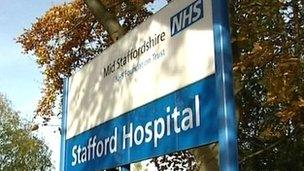Divisions in Stafford over scandal-hit hospital
- Published

Experts are assessing how services in the area should be re-organised
A snug roadside cafe in Stafford is the campaign headquarters for Cure the NHS.
Here, year-in year-out, patients' relatives and friends have fought to expose abuses at their local hospital and ensure they can never happen again.
Their accounts of callous neglect, bullying and incompetence - presented in official reports - provoked horror that the health service could sink so low.
They are fighting still.
Julie Bailey, who runs the cafe, has written a harrowing account of the events leading up to her mother's death in the hospital five years ago, and of the battle to be heard as the protests gathered momentum. She is convinced nothing much has changed.
"No food, no fluids, no medication, a long wait for the toilet, confused patients not being treated properly. All of those things I've listened to in this week."
Bill Swindells turned to Cure the NHS following the death of his wife Anne a few months ago. He says nurses were rude and rough, and that the hospital failed to answer his questions about her medication.
"They've got to be told either to leave the hospital or do something about their attitude and the way they treat patients. Because it's happening now. It's happening this afternoon."
'Concealing the Truth'
Julie Bailey says the trust is withholding information about complaints: concealing the truth about its performance - just as it did at the height of the scandal, between 2005 and 2009.
"The people who come to me and tell me that their relative has fallen or has had a serious untoward incident happened to them, nothing is recorded in their case-notes.
So I know that they are not being honest with the information that they're putting in files and they're recording and showing the regulator."
That is rejected by the trust, which maintains it is one of the most open and transparent in the NHS.
The chief executive Lyn Hill-Tout points to changes on wards which - in the past - were singled out for criticism.
She says they are now much better staffed, more caring and comfortable. Patient satisfaction is high, she says, and mortality rates much improved.
But she knows campaigners from Cure the NHS are not persuaded.
"We have to convince Cure the NHS and indeed other stakeholders through the evidence that we produce and the improvements have to be based on evidence.
"I think the information around the improvements needs to be taken in the round, not just the negative - and of course there will always be negative - but also the positives as well."
Death threats
The scandal at the hospital opened deep divisions in the town. Julie Bailey still gets abusive phone calls and emails because of her campaigning activities.
Last year, she received death threats after the A&E unit was closed at nights amid safety concerns.
But there has also been a groundswell of positive support. Cheryl Porter helped to organise a petition backing the hospital which drew more than 20,000 signatures.
"We felt that while we were trying to save our A&E that we would also support the staff and let them know that the community were behind them and that they did appreciate the jobs that were done there. We wanted them to know that."
The health service regulator Monitor has appointed independent consultants to look at how services in the area should be re-organised - to ensure that they meet local needs, and the NHS can afford them.
This could herald the further withdrawal of services from the hospital.
Uncertain future
Local GPs - taking over responsibility for NHS budgets - will have a crucial say.
Dr Anne-Marie Houlder from the Stafford and Surrounds Clinical Commissioning Group says there have been improvements at the hospital. But its future is uncertain.
"There may be some uncomfortable decisions.
"We've already made uncomfortable decisions but as long as you can hold your head up and say I did it for the right reasons, I did it for patient safety, I did it in the best interests of patients, then I don't feel uncomfortable about that."
Health minister Dr Dan Poulter said: "The Care Quality Commission recognises that Mid Staffordshire has made improvements in recent years, but the trust still has financial problems, which will make it more difficult to maintain and build on improvements in services for patients.
"That is why a small team has been sent into Mid Staffs to work with local doctors, nurses and trust managers to look at options for the future which will ensure that local patients still have access to high quality healthcare services."
The scandal at Mid Staffordshire is still reverberating around the NHS.
A public inquiry into failures of regulation will report its findings early next year.
And as the arguments rage on over standards of care at Stafford hospital, it's clear that the decisions taken here will send an important signal for other district general hospitals across the country - facing similar pressures to pare back or re-locate services in order to survive.
- Published11 September 2012
- Published3 September 2012
- Published9 May 2012